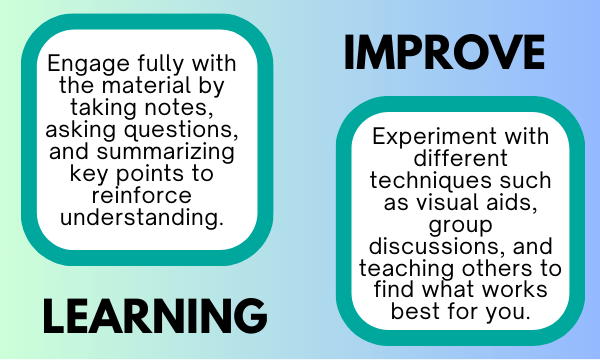How to Improve Learning Skills
How to improve learning skills, Learning is a lifelong journey that enriches our lives and opens doors to endless opportunities. Whether you’re a student, a professional, or someone simply looking to expand their knowledge, enhancing your learning skills is key to unlocking your full potential.
Introduction to Learning Skills
Before delving into strategies to how to improve learning skills, it’s essential to understand what learning skills entail. Learning skills encompass a range of abilities, including comprehension, retention, critical thinking, and problem-solving. These skills are not only crucial for academic success but also for personal and professional growth.
Understanding Learning Styles
People learn in different ways, and recognizing your preferred learning style can significantly impact your ability to absorb and retain information effectively. The three primary learning styles are:
Visual Learners
Visual learners prefer information presented in a visual format, such as diagrams, charts, and graphs. They benefit from colorful illustrations and mind maps that help them visualize concepts.
Auditory Learners
Auditory learners learn best through listening. They grasp information more effectively through lectures, discussions, podcasts, and audiobooks.
Kinesthetic Learners
Kinesthetic learners learn by doing. They thrive in hands-on activities, experiments, and simulations that allow them to physically engage with the material.
Importance of Improving Learning Skills
Enhancing your learning skills not only boosts academic performance but also fosters adaptability, creativity, and problem-solving abilities. In today’s rapidly changing world, continuous learning is essential for staying competitive and agile in various domains.
Tips to Enhance Learning Skills
Improving learning skills requires intentional effort and the adoption of effective strategies. Here are some tips to help you maximize your learning potential:
Create a Conducive Environment
Establish a dedicated study space free from distractions, where you can focus solely on learning tasks.
Use Active Learning Techniques
Engage actively with the material by summarizing key points, asking questions, and making connections to real-life scenarios.
Break Down Complex Information
Divide complex topics into smaller, more manageable chunks to facilitate understanding and retention.
Practice Retrieval and Spaced Repetition
Test yourself regularly to reinforce learning and employ spaced repetition techniques to review material at intervals over time.
Stay Organized and Manage Time Effectively
Develop a study schedule, set realistic goals, and prioritize tasks to make the most of your learning time.
Seek Feedback and Ask Questions
Don’t hesitate to seek clarification from teachers, peers, or mentors, and use feedback to identify areas for improvement.
MAIN POINTS TO IMPROVE LEARNING SKILLS




Also read ⇓
Learn How to Improve Communication Skills Fast
Utilizing Technology for Learning
Technology offers a plethora of tools and resources to support learning, from online courses and interactive tutorials to educational apps and virtual reality simulations. Embrace technology as a supplement to traditional learning methods to enhance engagement and accessibility.
Overcoming Learning Challenges
While learning is a rewarding endeavor, it’s not without its challenges. Common obstacles include procrastination, lack of motivation, and difficulty concentrating. Addressing these challenges requires self-awareness, discipline, and resilience.
Mindfulness and Learning
Practicing mindfulness can enhance learning by promoting focus, reducing stress, and improving cognitive function. Incorporate mindfulness techniques such as deep breathing exercises and meditation into your daily routine to cultivate a calm and centered mindset.
Healthy Habits for Improved Learning
A healthy body supports a healthy mind. Prioritize self-care by ensuring you get adequate sleep, maintain a balanced diet, stay hydrated, and engage in regular physical activity.
The Role of Curiosity in Learning
Curiosity is the driving force behind learning. Cultivate your curious mindset by asking questions, exploring new ideas, and seeking out diverse perspectives. Embrace curiosity as a catalyst for discovery and innovation.
Learning from Mistakes
Mistakes are valuable learning opportunities. Instead of fearing failure, view mistakes as stepping stones to growth and improvement. Analyze what went wrong, adjust your approach, and persevere with resilience.
The Power of Positive Thinking
A positive attitude can work wonders for learning. Maintain a growth mindset, believe in your ability to learn and improve, and approach challenges with optimism and determination.
Continuous Learning and Growth Mindset
Learning is not a destination but a journey. Embrace a growth mindset that values continuous learning, adaptability, and resilience. Stay curious, remain open to new experiences, and never stop challenging yourself to grow.
Conclusion
Improving learning skills is a transformative journey that empowers individuals to unlock their full potential and thrive in a rapidly evolving world. By embracing effective strategies, cultivating healthy habits, and fostering a growth mindset, anyone can enhance their learning abilities and achieve success in their academic, professional, and personal endeavors.
FAQs
- How long does it take to improve learning skills?
- Improving learning skills is a gradual process that varies from person to person. Consistent practice, patience, and perseverance are key to seeing progress over time.
- Can anyone improve their learning skills, regardless of age?
- Absolutely! Learning is a lifelong endeavor, and people of all ages can benefit from enhancing their learning skills. It’s never too late to start.
- Are there specific techniques for improving memory?
- Yes, several memory-enhancing techniques, such as mnemonic devices, visualization, and association, can help improve retention and recall of information.
- How can I stay motivated when learning becomes challenging?
-
- Find intrinsic motivation by connecting your learning goals to your passions and interests. Break tasks into smaller, manageable steps, celebrate progress, and seek support from peers or mentors.
- Is it necessary to use technology for learning, or are traditional methods sufficient?
- While traditional methods have their merits, incorporating technology into learning can enhance engagement, accessibility, and interactivity. It’s beneficial to leverage both traditional and technological resources for a well-rounded learning experience.







